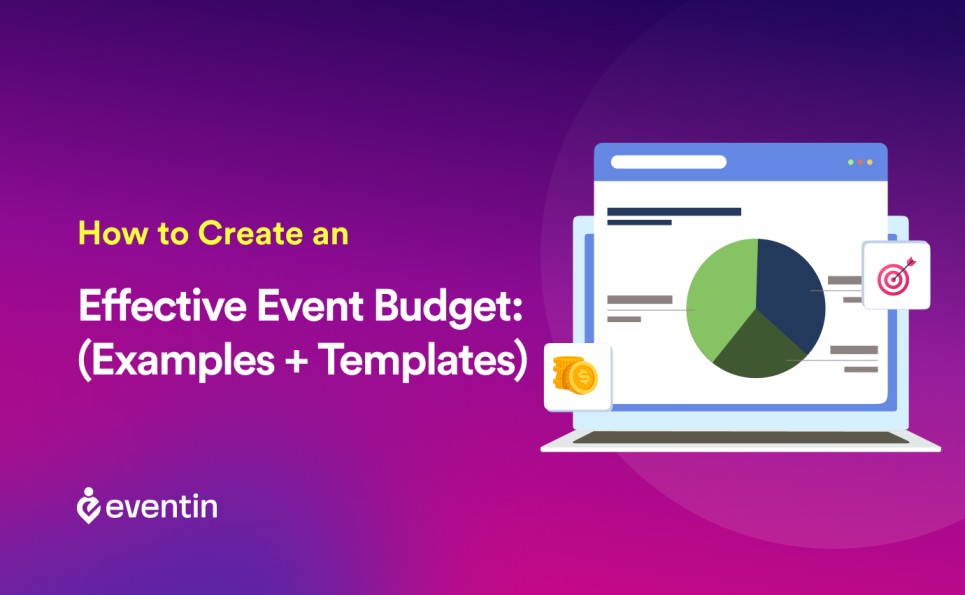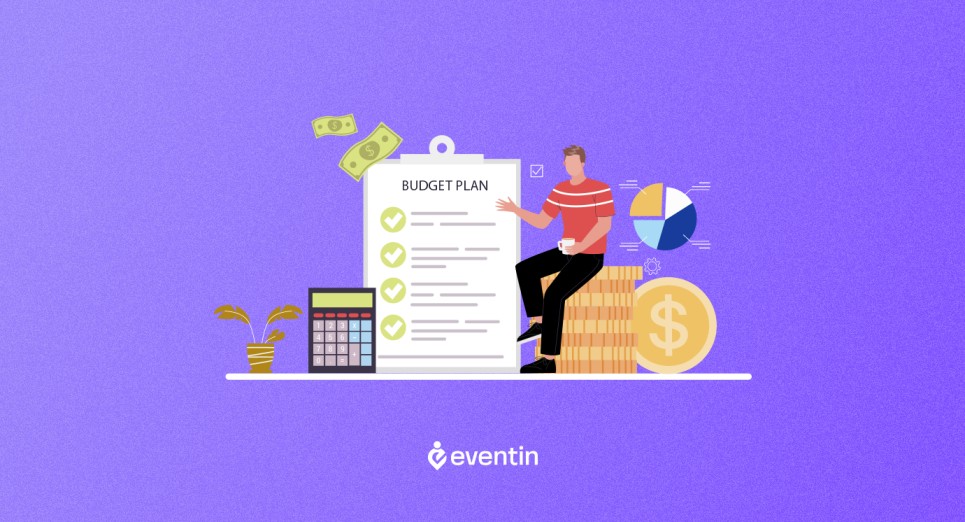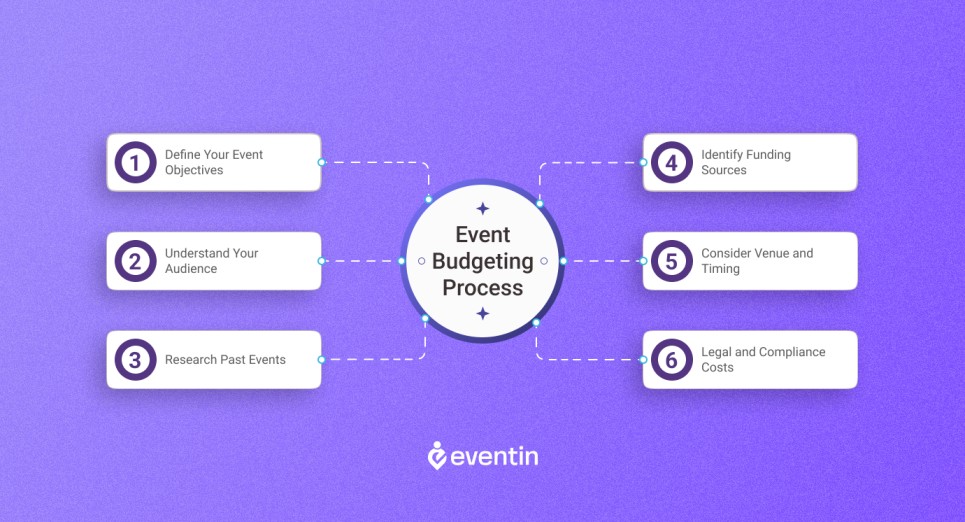How to Create an Efficient Event Budget: (Templates + Examples)

Imagine planning an event only to have unexpected costs threaten to derail your budget. It’s a common scenario for event planners everywhere, which underscores the importance of creating an effective event budget planning.
Whether you’re organizing a corporate gala, a nonprofit fundraiser, or a milestone celebration, mastering the art of budgeting is crucial.
In this blog, we’ll explore the essentials of event budgeting, from outlining potential expenses and income sources to utilizing strategic templates and tools. You’ll learn how to forecast costs, refine your budget, and manage finances seamlessly.
With expert tips and practical examples, you’ll gain the confidence to ensure your event shines without the stress of financial surprises.
Ready to elevate your event budget planning skills? Let’s dive in!
Section 1: Understanding Event Budgeting

Before diving into the nuts and bolts of creating an event budget, it’s important to understand what an event budget is and why it’s crucial to the success of any event. An event budget is a projection of the costs and revenues associated with your event. It serves as a financial blueprint, guiding your decisions and ensuring that you allocate resources efficiently.
The Role of an Event Budget
- Control: A well-planned budget gives you control over your finances, ensuring that spending aligns with your event goals.
- Prioritization: It helps you prioritize expenses, highlighting where you can splurge and where you need to cut back.
- Forecasting: Budgets are not just about tracking costs but also about forecasting potential financial outcomes, helping you to anticipate and manage risks.
- Performance Measurement: It provides a benchmark against which you can measure the actual performance of the event, identifying areas for improvement in future events.
Key Components of an Event Budget
Your event budget should include detailed categories of both expenses and income. Here are the primary components:
- Expenses: These might include venue rental, catering, entertainment, technology, decorations, marketing, and personnel costs. Each item should be estimated as accurately as possible and tracked meticulously.
- Income: This can come from ticket sales, sponsorships, donations, or merchandise. Accurate projections and tracking of income are as important as managing expenses.
Understanding these basics sets the stage for more detailed planning in the following sections, where we will guide you through the steps of creating, managing, and adjusting your event budget to ensure your event is both memorable and financially successful.
Section 2: Initial Considerations Before Drafting a Budget

Drafting an effective event budget requires more than just crunching numbers. It starts with a clear understanding of the strategic underpinnings that shape the entire event budget planning process.
Here are the key initial considerations you should explore before setting your budget-
Define Your Event Objectives
What do you aim to achieve with your event? Whether it’s raising awareness for a cause, generating revenue, or celebrating a milestone, each objective will have different financial implications and priorities. Setting clear, measurable goals upfront will guide your budgeting decisions and help you allocate resources effectively.
Understand Your Audience
Identifying who will attend your event influences many budget items, from the choice of venue to the type of catering and activities provided. Understanding your audience’s preferences and expectations ensures that you allocate your budget to enhance their experience, ensuring a better turnout and more satisfied attendees.
Research Past Events
Look at similar events you’ve hosted in the past. What worked? What didn’t? Reviewing previous budgets, sales data, and feedback can provide invaluable insights that help you forecast more accurately and avoid past mistakes.
Identify Funding Sources
Your budget isn’t just about expenses; it’s also about where the money comes from. Typical sources include ticket sales, sponsorships, grants, or corporate backing. Each source might come with its stipulations and restrictions, which can influence the event budget planning process.
Consider Venue and Timing
Select the Right Setting and Time: Venue costs can vary widely based on location, size, and timing. High-demand times and places will be more expensive. Additionally, the date and time of your event might affect attendance, which in turn impacts revenue from ticket sales and on-site purchases.
Legal and Compliance Costs
Depending on the nature of your event, you may need permits, insurance, and compliance with local laws, which can add unexpected expenses. Early identification of these requirements can prevent last-minute scrambles and financial overruns.
Section 3: Step-by-Step Guide to Creating Your Event Budget
Creating an effective event budget involves careful planning and foresight. Here’s a step-by-step guide to help you navigate through the process, ensuring that you cover all necessary bases from setting your financial goals to refining the budget as you go.
Step 1: Set Your Financial Goals
Begin by establishing clear financial objectives for your event. Are you looking to break even, generate a profit, or perhaps host an event as a non-profit initiative? Your financial goals will guide every decision you make, from venue selection to marketing efforts. Setting these goals early helps you create a framework for your budget and provides a benchmark against which you can measure your success.
Step 2: List All Potential Expenses
Every event is unique, but certain expenses are common across nearly all types of gatherings. These include:
- Venue: Rental costs can vary widely depending on location, size, and popularity.
- Catering: This may include food and drink costs per person.
- Technology: Audiovisual equipment, live streaming services, and technical support.
- Décor and Setup: Flowers, banners, signage, and other decorations.
- Staffing: Security, event coordinators, wait staff, and other personnel.
- Marketing: Digital advertising, print materials, and promotional items.
- Licenses and Permits: Depending on the event location and nature.
Here’s a table of typical event expenses to consider:
| Expense Category | Expected Cost Range |
| Venue Rental | $500 – $5,000 |
| Catering | $15 – $100 per person |
| Technology | $200 – $2,000 |
| Décor and Setup | $300 – $3,000 |
| Staffing | $100 – $1,500 |
| Marketing | $250 – $2,500 |
| Licenses/Permits | $50 – $500 |
Step 3: Estimate Your Revenue
Next, project your revenue streams, which could include:
- Ticket Sales: Price your tickets based on the event’s value proposition and your target audience.
- Sponsorships: Partner with businesses that see the value in being associated with your event.
- Donations: Especially relevant for charitable events or causes.
Here’s a table of potential revenue streams:
| Revenue Source | Potential Income |
| Ticket Sales | $1,000 – $10,000 |
| Sponsorships | $500 – $15,000 |
| Donations | $100 – $5,000 |
Step 4: Use Forecasting to Predict Unexpected Costs
Anticipate unexpected costs by setting aside a contingency fund. Typically, this should be around 10-20% of your total expected expenses. This fund covers unforeseen expenses like last-minute venue changes, weather-related issues, or additional staffing needs.
Step 5: Adjust and Refine the Budget
As your event budget planning progresses, regularly review and adjust your budget. Track all expenses in real-time to ensure you remain on target. Make adjustments as needed, whether reallocating funds to cover shortfalls or scaling back on less critical areas to maintain financial integrity.
Section 4: Tips for Managing and Adjusting Your Budget

Effective budget management is crucial for the success of any event. It requires diligence, flexibility, and a proactive approach to handling finances. Here are practical tips for managing and adjusting your event budget to ensure that your event stays on track financially without sacrificing quality or guest experience.
Tip 1: Monitor Your Spending Closely
Use a detailed tracking system to monitor your expenses in real time. This could be a spreadsheet or a budget management software that allows you to input expenses as they occur. Regular monitoring helps you stay aware of your financial status at any given point and prevents budget overruns.
Tip 2: Review Budget Weekly
Make it a habit to review your budget at least once a week. This routine check-in allows you to compare your planned expenditures against what you’ve actually spent and make necessary adjustments. It’s also a perfect time to forecast upcoming costs and ensure that you have the funds to cover them.
Tip 3: Keep Communication Open With Your Team
Ensure that everyone involved in the event planning process understands the budget constraints and financial goals. Regular meetings with your team can help align efforts, share financial insights, and discuss any potential budget adjustments that may be necessary due to changing circumstances.
Tip 4: Anticipate and Plan for Contingencies
As mentioned earlier, unexpected costs can arise during any stage of the event planning process. Having a contingency fund is essential, but it’s also important to identify areas where costs might overrun and preemptively plan strategies to address these without compromising other elements of the event.
Tip 5: Utilize Cost-Saving Measures
Look for opportunities to reduce costs without affecting the quality of the event. This might involve negotiating with suppliers and vendors for better rates, choosing a less expensive venue, or simplifying the event program. Creative cost-cutting can often lead to even more innovative event budget planning.
Tip 6: Be Ready to Scale Back
If revenue projections are not met or unexpected expenses rise, be prepared to make tough decisions about what aspects of the event can be scaled back. Prioritize spending on elements that directly contribute to the event’s goals and guest satisfaction.
Tip 7: Document Everything
Keep thorough records of all financial transactions, agreements, receipts, and communications regarding the event’s finances. This documentation will be invaluable for reviewing the event’s success, planning future events, and resolving any disputes that may arise.
Section 5: Examples of Effective Event Budgets
Understanding how to apply theoretical budgeting strategies can be made easier with practical examples. Here are three real-world scenarios showcasing how diverse types of events manage their budgets effectively. Each example includes the initial financial goals, main expenses, revenue sources, and key strategies for staying within budget.
Case Study 1: Corporate Event
Event Overview:
- Type of Event: Annual Corporate Conference
- Attendees: 300
- Location: Downtown Conference Center
- Objective: To facilitate networking and professional development.
Budget Strategy:
- Financial Goal: Break-even
- Major Expenses: Venue rental, professional speakers, catering, and AV equipment.
- Revenue Streams: Ticket sales and sponsorships.
Execution:
The team focused on securing sponsorship deals early, which covered 60% of the total budget. They opted for a ticket price that was competitive yet sufficient to cover the remaining costs. Expenses were kept under control by choosing a local venue to eliminate travel costs and negotiating package deals with the venue for catering and AV services.
Case Study 2: Nonprofit Fundraiser
Event Overview:
- Type of Event: Charity Gala
- Attendees: 200
- Location: Local Art Gallery
- Objective: Raise funds for community arts programs.
Budget Strategy:
- Financial Goal: Maximize donations
- Major Expenses: Venue rental, entertainment, and light refreshments.
- Revenue Streams: Ticket sales, donations, and silent auctions.
Execution:
The nonprofit utilized the art gallery at a reduced cost by partnering with them as a co-beneficiary of the gala. They focused on low-cost, high-impact decor and sourced entertainment from local artists who performed at a reduced rate for the cause. The silent auction featured donated items, ensuring that nearly all revenue went directly into the programs.
Case Study 3: Personal Celebration (Wedding)
Event Overview:
- Type of Event: Wedding Reception
- Attendees: 100
- Location: Family-owned farmhouse
- Objective: Celebrate a marriage with family and friends.
Budget Strategy:
- Financial Goal: Keep personal costs low
- Major Expenses: Catering, décor, and live band.
- Revenue Streams: N/A (personal funding)
Execution:
To minimize costs, the couple used a family-owned location, reducing venue expenses to zero. They hired a local catering company that offered seasonal dishes at a discount. Decorations were handmade or purchased from budget-friendly stores, and the live band was a local group who provided a friendly rate for a longer set.
Each of these examples demonstrates how clear objectives, careful planning, and creative strategies can lead to budgeting success across various event types. Whether you’re managing a large corporate function, a nonprofit event, or a personal celebration, these insights can help guide your budgeting process to meet and exceed your financial goals.
Wrapping Up
In wrapping up, mastering event budget planning is all about meticulous planning, proactive monitoring, and strategic adjustments.
Utilize the tools and templates we’ve discussed to streamline your process and ensure financial success. Whether you’re planning a small party or a large gala, these principles will guide you toward hosting an event that’s both memorable and financially viable.
Keep revisiting these strategies for every new event to continually refine and enhance your budgeting skills. Here’s to planning successful events that impress and achieve their goals!
Want to Learn More?
➡️ Google Meet Vs Zoom: Which One Is Best for Your Next Event? | Read More
➡️ Create multiple types of tickets and set different price | Read More
➡️ How to Choose the Best Event Management Plugin for Your Website | Read More
Frequently Asked Questions (FAQ)

How much should I allocate for unexpected expenses in my event budget?
Typically, it’s wise to reserve 10-20% of your total budget for contingencies. This will cover unexpected costs without compromising the financial stability of your event.
What are the most commonly overlooked expenses in event planning?
Often, planners forget to account for costs such as taxes, service fees, and gratuities. Also, last-minute technical support and additional décor can unexpectedly increase expenses.
How can I reduce costs without sacrificing the quality of the event?
Focus on major expenses that offer alternatives, like opting for digital invitations over printed ones or selecting a venue that provides in-house services which can lower overall costs.
Are there any tools specifically helpful for nonprofit event budgeting?
Yes, tools like QuickBooks offer features that cater to nonprofit needs, and platforms like Cvent provide robust options for managing donations and sponsorships alongside regular event expenses.
How often should I review the event budget during the planning process?
Review your budget at least once a week during the planning phase and daily as the event approaches. This frequent review helps catch and address discrepancies early.
Can software replace the need for a financial planner or event budget manager?
Software can significantly streamline budget management, but it doesn’t replace the expertise and personalized guidance that a professional financial planner or budget manager can offer, especially for large or complex events.



